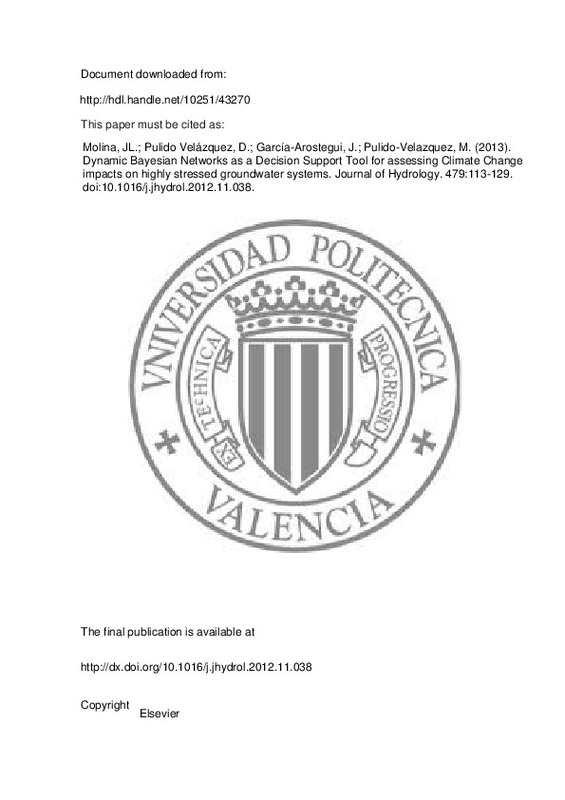JavaScript is disabled for your browser. Some features of this site may not work without it.
Buscar en RiuNet
Listar
Mi cuenta
Estadísticas
Ayuda RiuNet
Admin. UPV
Dynamic Bayesian Networks as a Decision Support Tool for assessing Climate Change impacts on highly stressed groundwater systems
Mostrar el registro sencillo del ítem
Ficheros en el ítem
| dc.contributor.author | Molina, José Luis
|
es_ES |
| dc.contributor.author | Pulido Velázquez, David
|
es_ES |
| dc.contributor.author | García-Arostegui, J.L.
|
es_ES |
| dc.contributor.author | Pulido-Velazquez, M.
|
es_ES |
| dc.date.accessioned | 2014-10-15T07:05:30Z | |
| dc.date.available | 2014-10-15T07:05:30Z | |
| dc.date.issued | 2013-02-04 | |
| dc.identifier.issn | 0022-1694 | |
| dc.identifier.uri | http://hdl.handle.net/10251/43270 | |
| dc.description.abstract | Bayesian Networks (BNs) are powerful tools for assessing and predicting consequences of water management scenarios and uncertain drivers like climate change, integrating available scientific knowledge with the interests of the multiple stakeholders. However, among their major limitations, the non-transient treatment of the cause-effect relationship stands out. A Decision Support System (DSS) based on Dynamic Bayesian Networks (DBNs) is proposed here aimed to palliate that limitation through time slicing technique. The DSS comprises several classes (Object-Oriented BN networks), especially designed for future 5 years length time steps (time slices), covering a total control period of 30 years (2070-2100). The DSS has been developed for assessing impacts generated by different Climate Change (CC) scenarios (generated from several Regional Climatic Models (RCMs) under two emission scenarios, A1B and A2) in an aquifer system (Serral-Salinas) affected by intensive groundwater use over the last 30 years. A calibrated continuous water balance model was used to generate hydrological CC scenarios, and then a groundwater flow model (MODFLOW) was employed in order to analyze the aquifer behavior under CC conditions. Results obtained from both models were used as input for the DSS, considering rainfall, aquifer recharge, variation of piezometric levels and temporal evolution of aquifer storage as the main hydrological components of the aquifer system. Results show the evolution of the aquifer storage for each future time step under different climate change conditions and under controlled water management interventions. This type of applications would allow establishing potential adaptation strategies for aquifer systems as the CC comes into effect | es_ES |
| dc.description.sponsorship | This study has been partially supported by the European Community 7th Framework Project GENESIS (226536) on groundwater systems and from the subprogram Juan de la Cierva (2010) of the Spanish Ministry of Science and Innovation as well as from the Plan Nacional I+D+i 2008-2011 of the Spanish Ministry of Science and Innovation (Subprojects CGL2009-13238-C02-01 and CGL2009-13238-C02-02). T. Finally, the authors want to thank the Segura River Basin Agency (Confederacion Hidrografica del Segura) for the data and information facilitated, and to all the stakeholders who have collaborated in this research. | en_EN |
| dc.language | Inglés | es_ES |
| dc.publisher | Elsevier | es_ES |
| dc.relation.ispartof | Journal of Hydrology | es_ES |
| dc.rights | Reserva de todos los derechos | es_ES |
| dc.subject | Dynamic Bayesian Networks | es_ES |
| dc.subject | Climate Change | es_ES |
| dc.subject | Decision Support Systems | es_ES |
| dc.subject | Aquifers management | es_ES |
| dc.subject | Impacts | es_ES |
| dc.subject | Groundwater intensive use | es_ES |
| dc.subject.classification | INGENIERIA HIDRAULICA | es_ES |
| dc.title | Dynamic Bayesian Networks as a Decision Support Tool for assessing Climate Change impacts on highly stressed groundwater systems | es_ES |
| dc.type | Artículo | es_ES |
| dc.identifier.doi | 10.1016/j.jhydrol.2012.11.038 | |
| dc.relation.projectID | info:eu-repo/grantAgreement/EC/FP7/226536/EU/Groundwater and dependent Ecosystems: NEw Scientific basIS on climate change and land-use impacts for the update of the EU Groundwater Directive/ | en_EN |
| dc.relation.projectID | info:eu-repo/grantAgreement/MICINN//CGL2009-13238-C02-01/ES/Generación y simulación de escenarios futuros de hidrología superficial y subterránea (GESHYDRO)/ | es_ES |
| dc.relation.projectID | info:eu-repo/grantAgreement/MICINN//CGL2009-13238-C02-02/ES/Modelos hidroeconómicos para adaptar la gestión de sistemas de recursos hídricos al cambio climático (HYDROECOCLIMATE)/ | es_ES |
| dc.rights.accessRights | Abierto | es_ES |
| dc.contributor.affiliation | Universitat Politècnica de València. Departamento de Ingeniería Hidráulica y Medio Ambiente - Departament d'Enginyeria Hidràulica i Medi Ambient | es_ES |
| dc.contributor.affiliation | Universitat Politècnica de València. Instituto Universitario de Ingeniería del Agua y del Medio Ambiente - Institut Universitari d'Enginyeria de l'Aigua i Medi Ambient | es_ES |
| dc.description.bibliographicCitation | Molina, JL.; Pulido Velázquez, D.; García-Arostegui, J.; Pulido-Velazquez, M. (2013). Dynamic Bayesian Networks as a Decision Support Tool for assessing Climate Change impacts on highly stressed groundwater systems. Journal of Hydrology. 479:113-129. https://doi.org/10.1016/j.jhydrol.2012.11.038 | es_ES |
| dc.description.accrualMethod | S | es_ES |
| dc.relation.publisherversion | http://dx.doi.org/10.1016/j.jhydrol.2012.11.038 | es_ES |
| dc.description.upvformatpinicio | 113 | es_ES |
| dc.description.upvformatpfin | 129 | es_ES |
| dc.type.version | info:eu-repo/semantics/publishedVersion | es_ES |
| dc.description.volume | 479 | es_ES |
| dc.relation.senia | 252543 | |
| dc.contributor.funder | Ministerio de Ciencia e Innovación | es_ES |







![[Cerrado]](/themes/UPV/images/candado.png)

